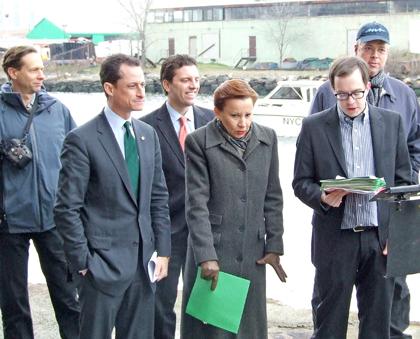By Nathan Duke
Western Queens elected officials at the federal and city levels gathered last week at Newtown Creek to renew their call to the federal government to add the polluted waterway, which separates Queens and Brooklyn, to the national Superfund registry.
The creek is the site of a massive oil spill, discovered by a U.S. Coast Guard helicopter patrol in 1978, which was believed to have started at least 50 years ago along the banks of the waterway, where Standard Oil once operated a massive oil refinery.
U.S. Reps. Nydia Velazquez (D−Ridgewood) and Anthony Weiner (D−Forest Hills) stood on the Brooklyn bank of the creek Friday and pleaded with the federal government to designate the waterway as a Superfund site, which would make it eligible for federal funding that could cover 90 percent of its cleanup.
“For too long, we have allowed the Newtown Creek scandal to be something about which we said, ‘Tsk, tsk,’” Weiner said. “Now, we will no longer say that another generation has to deal with the largest underground oil spill in the United States. If it means dragging oil companies into court, we’ll do that.”
Superfund sites were designated in 1980 when Congress enacted an environmental law to protect communities from heavily contaminated waste sites that have been abandoned. Congress approved a measure last year that would require the federal Environmental Protection Agency to conduct its own independent study of the oil spill that has yet to be released.
But Michael Schade, a spokesman for Manhattan’s Center for Health, Environment and Justice, said the Superfund program received little support from former President George W. Bush’s administration and has nearly run out of money. But President Barack Obama has shown support for the program and included money for it in his proposed budget.
Velazquez said current laws require funding for the cleanup of Superfund sites to be recouped through tax dollars rather than forcing polluters to pay.
“The polluters should pay for the environmental degradation they caused,” she said. “They should clean up their own mess.”
ExxonMobil, Standard Oil’s descendant, entered into two consent orders in 1990 with the state Department of Environmental Conservation to remove petroleum from the ground beneath Greenpoint, Brooklyn.
In a statement, ExxonMobil said it was cooperating with the EPA for its part in cleaning up the underground spill.
“ExxonMobil takes its environmental responsibilities seriously,” it said.
The oil giant said it supports a comprehensive investigation of the creek’s environmental conditions.
A DEC study released last year estimated that the spill could be anywhere between 17 million and 30 million gallons. Several other oil companies, including BP and Chevron, are also responsible for the cleanup.
At the current rate of recovery, the creek would be completely cleaned up by 2026, Weiner said. But the site could be cleaned within eight to 11 years if it were added to the Superfund registry, he said.
City Councilman Eric Gioia (D−Sunnyside) said residents on the Brooklyn side of the creek have suffered respiratory illnesses.
“The polluters and our government have turned a blind eye,” he said. “It’s time we take this very seriously. An entire generation of New Yorkers has failed to be the steward of our environment.”
Reach reporter Nathan Duke by e−mail at nduke@cnglocal.com or by phone at 718−229−0300, Ext. 156.



































